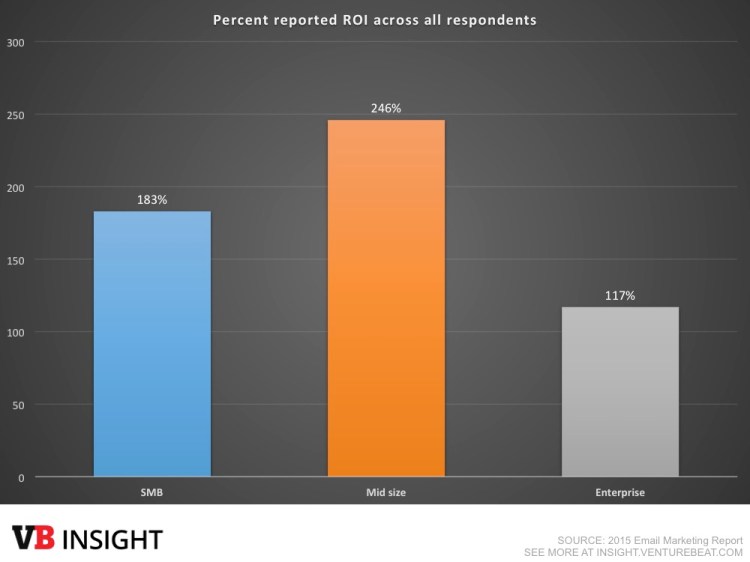Want smarter insights in your inbox? Sign up for our weekly newsletters to get only what matters to enterprise AI, data, and security leaders. Subscribe Now
Email continues to be critical to business, and generates the highest return on investment of any marketing channel.
There are dozens of email service providers and marketing tools available to help businesses leverage the medium, with MailChimp, AWeber, Constant Contact, and Campaign Monitor among the most used. Add to that the swathe of marketing automation platforms that offer email marketing services and you’re looking at quite a complex landscape.
In an extensive report launched by VB Insight today, we learn that 84 percent of marketers think email is important or critically important for loyalty. Similarly high percentages show how important it is for sales, retaining customers, and lead generation.
 But all is not rosy in the email marketing garden, as the report also shows only 50 percent of email marketers think their needs are effectively met by current providers. Worse still, email marketers aren’t using these tools effectively, despite their importance.
But all is not rosy in the email marketing garden, as the report also shows only 50 percent of email marketers think their needs are effectively met by current providers. Worse still, email marketers aren’t using these tools effectively, despite their importance.
The study — “Buyer’s Guide: How to navigate the email marketing landscape” — weighs in at 10,000 words and 60+ pages, and it details findings from almost 1,300 email marketers, evaluates 48,000 companies that use email tools, and profiles 21 leading vendors. The author, Jon Cifuentes, an analyst at VB Insight, found some surprises while creating the report.
“The single most surprising insight was to learn just how bad end users are at capturing data and applying it to decision making,” Cifuentes told me. “Thirty-two percent of enterprises don’t know on which devices their customers are opening emails. Twenty-nine percent aren’t even tracking revenue through emails.”
And that is a huge problem — one that sits at odds with the importance of email marketing.
“It is baffling to me when email is regularly reported as the digital marketing channel for net positive ROI,” Cifuentes said. “I’d say it’s inexcusable, but it’s clear their vendors aren’t showing them the way.”
The report states that most email tools have a high level of feature parity, but these solutions aren’t necessarily educating customers on how to best leverage email marketing.
“There’s an education problem at play, both in the vendors’ understanding of what end users need, and end users lacking data management skills,” Cifuentes said. “There’s a big difference between managing an email channel and being really successful with it.”
But because the results of email marketing are so good across the board, it seems that users are happy with their lot, not aware that they could be doing so much better.
“For whatever reason, email is just a medium so tightly integrated with our daily lives,” Cifuentes said. “Behaviorally, we’re just more likely to open an email with information, or a deal, we might find useful than we are to click a banner ad. This naturally lends the channel to being more successful than others from a marketing perspective, even if you’re not operating it at optimal levels.”
The ease with which email marketing tools can be operated might also be contributing to the problem.
“We also found the day-to-day mechanics of email being relegated to a relatively junior role in the organization,” Cifuentes said. “This is a huge mistake. To be great at email, you need deep left brain and right brain thought process; content and data talent. Or you need those organizational competencies along with fantastically nimble knowledge sharing. Both of those situations tend to be rare birds.”
The report also sheds light on where vendors are under-serving users, including mobile device support.
“It comes down to understanding consumer behavior and how rapidly that changes within the context of mobile devices,” Cifuentes said. “Just a couple of years ago, global email opens on mobile devices was tracking around 30 percent. Today, it’s over 50 percent. That’s a huge paradigm shift for both vendors and buyers. They’re still figuring out what works. Email is the ultimate test and learn platform.”
So what of the future?
According to the study, 75 percent of enterprises will be investing in personalized messaging in 2015. This is leading the most forward-thinking platforms to back away from the term “email marketing” and head towards different concatenations of “customer messaging.”
“It’s marketing speak, but there’s important subtlety there,” Cifuentes said. “Customer messaging can be push notifications or personalized chats, or messages through another application along with email. Those messages can be sent based on the activities of your application, whether that’s a website, mobile app, or landing page. Vendors who approach it this way — Customer.IO and Intercom come to mind — stand out. Both are companies on the rise.”
The entire report is available now on VB Insight for $299, or free to VB Insight marketing technology subscribers.


